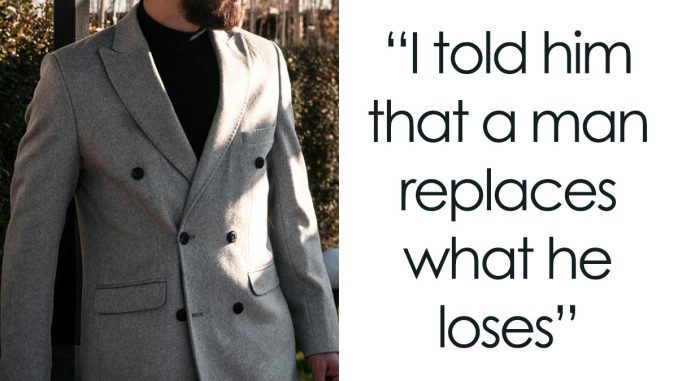
Even though most mornings, we throw on our outfits haphazardly, we all have that one piece of clothing that we absolutely love and plan to pass on to the following generations. Whether it’s an old rock band t-shirt or a patch denim jacket, it’s no longer just a part of your wardrobe; it’s a part of you and your legacy.
For redditor SouthRatio7410, it was a cashmere wool coat, which he proudly scored for $100 on clearance. But when he realized that his fiancée lent it to his brother-in-law and he lost it, he demanded generous compensation. The family disagreed, shaming him for wanting to make a profit. Upset with his loss, he turned to the “AITAH” subreddit, asking if what he did was wrong.
There are many rules to clothes-borrowing, like not damaging the item and returning it on time
Image credits: emre keshavarz (not the actual photo)
So when BIL blatantly lost a borrowed coat, its owner billed him $700
Image credits: Prostock-studio (not the actual photo)
Image credits: SouthRatio7410
Before borrowing clothes people should be aware of the etiquette behind it
Borrowing something to wear is a great option if a person wants to save money or has last-minute plans. But as new research suggests, 13% of people admitted to taking a garment without asking first, and one in five never gave it back.
Whether you’re the lender or lendee, sticking to certain etiquette rules will ensure everyone gets the most from the situation and that no one is being taken advantage of.
The first obvious rule is to always ask first. It doesn’t matter what the item is or how close you are to its owner; the best approach is to politely ask for permission (no exceptions!).
Clothing rental app creator Eshita Kabra-Davies advises setting a deadline for when the item should be returned. A person might let them keep it for a few months, or they might need it for a specific occasion relatively soon. Monitoring the time will help keep track of the garment, and it’ll be easier to remind the friend about giving it back if they forget.
Sentimental or precious clothing pieces should be off-limits. Kabra-Davies encourages lenders to think of the worst-case scenario before handing something over. If the thought of losing the item is unbearable, it’s probably best not to share it. She wouldn’t give extremely valuable accessories like watches, real jewelry, or things that can’t be replaced, like a vintage nightdress or family heirlooms.
It should also be a given that the borrowed clothes should come in the same condition they left the owner. That said, specific materials require different care, so some may expect clothing items to be washed, while others may prefer to take them to a dry cleaner they trust, especially if it’s a special piece. In such cases, making it clear in what condition the item should be returned will prevent ruined clothes.
Image credits: Priscilla Du Preez (not the actual photo)
Still, mishaps like spilled wine or lost coats happen
Even when one does everything right – mishaps like spilled wine or lost coats happen. The only way to approach this is to be honest and take responsibility for the damage. On the other hand, the lender has every right to be upset if the piece comes back destroyed or just vanishes.
In such cases, Kabra-Davies suggests finding a resolution that they find appropriate and fair before committing to lending. Depending on the piece’s value, a suffering party can ask to cover the costs of the cleaning or repairing services.
If the item is never to be seen again, sometimes it can be hard to repurchase the same one. Then, the wrongdoer can offer dinner or purchase a store’s gift card in exchange for it. But if the borrower couldn’t afford the piece in the first place, they may be too embarrassed to admit ruining it. Having a conversation about it, understanding their situation, and not pushing for quick compensation can solve the problem.
Those who don’t feel comfortable sharing their valuables or have too much anxiety about letting bad things happen to them can always say no. Denying something can be difficult, but it’s important to not give in to the pressure and be consistent. After all, it’s up to the person to decide what is best for them and their belongings.
Image credits: Jeff Tumale (not the actual photo)
Commenters crowned him as being right
Although a few people were on the BIL’s side
The post Man Refuses To Back Down After Fiancée’s Family Turn On Him Over $700 Coat first appeared on Bored Panda.
